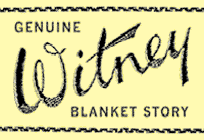Early's
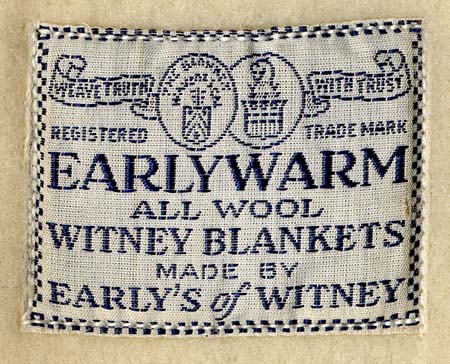 'Earlywarm' brand blanket label. Dates of operation: 1669
Origins and history
The history of the different members of the Early family in the
blanket industry is complicated but well documented: there were
several branches of the family who were involved in the
business, sometimes in partnership and sometimes as business
rivals. The family also tended to use the same Christian names
through many generations, which can sometimes make
distinguishing individuals difficult.
The first Earlys involved in the trade
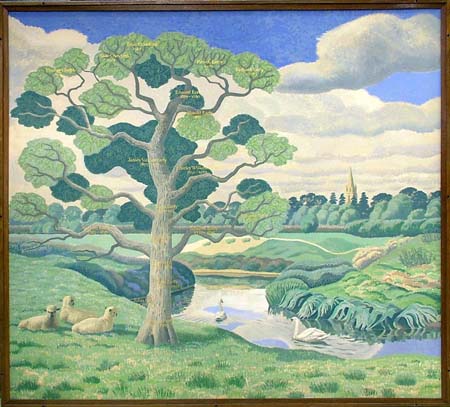 Painting depicting the Early family tree (the names are written
onto the tree), which hung for many years in the company offices.
The early 19th century
Edward Early (1775-1835) was using the north-east portion of New
Mill as a spinning mill, in partnership with his brother John
(1783-1862) and their brother-in-law Paul Harris. According to
the 1838 Assistant Hand-loom Weavers' Commission, there were no
less than four companies in Witney belonging to members of the
Early family: John Early and Co. had 70 looms, Richard Early had
25, John ('King') Early 30 and Edward Early 35 [1]. Already the
Earlys were the most important manufacturers of blankets in
Witney.
Edward Early and Sons
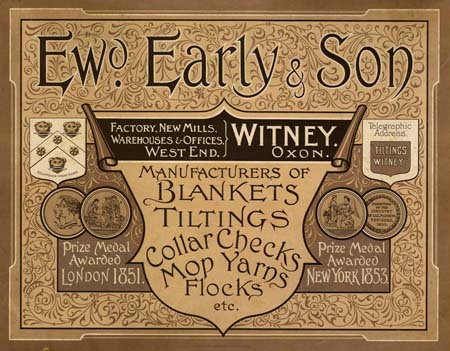 Edward Early and Son advertising sign, dating to after the
merger with Charles Early and Co.
During the 1850s there seems to have been considerable rivalry
between Edward Early and Sons and John Early and Co. despite
their close family ties, to the extent that in 1859 the
notepaper of the former stated that they had 'No connection with
any other Firm by the name of Early', but this situation had
eased by 1860 [4].
Charles Early and Co.
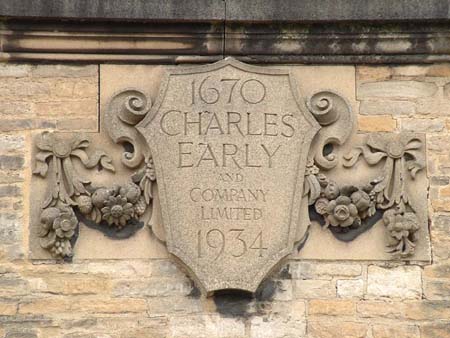 Plaque outside Witney Mill, 1934. It reads, '1670 CHARLES EARLY
AND COMPANY LIMITED 1934'.
Charles inherited the business when John died in 1862 and by
1864 it was known as Charles Early and Co., a name it retained
until 1960 [6]. By 1860 Charles had started to install power
looms at Witney Mill and in March 1888 bought the neighbouring
Woodford Mill and an adjacent flour mill, transforming the
Witney Mill site into the main production centre for the company
[7].
As early as 1866 Charles had acquired an interest in part of the
south-west half of New Mill, which he bought outright from the
Ecclesiastical Commissioners in 1883 [8]. He acquired the
remaining part in 1894 from Walter and Thomas Early and Co.,
bringing New Mill entirely under his control. About the same
time, he also took over Edward Early and Son's business in West
End, Witney, which was run as a subsidiary company, as well as
Henry Early's mill at The Captains, also in West End [9].
Thomas and Walter Early and Co.
In 1874 the north-east part of New Mill was inherited by three
of Edward Early's children, of whom one was Walter Early
(1849-1894). Walter set up a spinning business there with his
brother Thomas and they were also involved in mop-making in
Bridge Street, Witney [10]. In addition, Kelly's Directory of
1891 lists 'Thomas and Walter Early, woollen manufacturers, West
end' [11]: the location of these premises is unknown but it may
be the building resembling a blanket mill that behind numbers 62
and 64 West End.
New Mill burnt down in 1883; the fire was thought by some at the
time to be the work of Thomas Early who was considered to be
eccentric or even insane. His part of the mill was though,
heavily insured. In 1892 Charles Early recorded that he advanced
Thomas and Walter £800 for a new building but only two years
later bought their part of the mill for £3000 when Walter
committed suicide [12].
Richard Early and Henry Early
Another branch of the family were involved in making blankets at
Worsham Mill, which Charles' cousin Richard Early bought in
1864. When he died in 1874 it passed to his son Arthur, but
Arthur became ill and the mill was leased for 21 years from 1877
to his uncle Henry Early, who made blankets there. It is
possible that he also made cycles too, because when the mill was
transferred to Pritchett and Webley the transfer document
included 'the goodwill of the business of woollen and cycle
manufacture' [13].
Henry had also acquired the factory on Woodgreen, Witney, and
made blankets there from the 1860s until his business failed
sometime in the 1890s - he is recorded as a 'woollen
manufacturer' in Kelly's 1891 Directory [14] but does not appear
in the 1903 edition. It is possible that his premises were just
too large to be economic [15]. In addition, it was probably
Henry who made blankets at The Captains, a small mill and
warehouse in West End, Witney (very near Edward Early and Sons'
West End factory).
Worsham Mill was transferred to Pritchett and Webley in 1896
[16], while Charles Early and Co. acquired the Witney premises
of The Captains, probably at the same time.
The 20th century
 Advertising sign for 'Earlywarm' brand blankets, first half 20th
century.
Charles Early and Marriott (Witney) Ltd. changed its name to
Early's of Witney in 1981. In December 1984 Courtaulds' sold
their holding in the company to Clayhithe, which brought in new
management. Grovewood Securities made a takeover bid in March
1990 which succeeded after it was approved by Clayhithe, only
for Grovewood to go into receivership a year and a half later,
putting Early's into receivership with it.
 Advertising booklet for Early's of Witney. Products and operations
 Early's 'Witney Point' blanket label.
Following the introduction of Fiberweavers much effort was put
into maximising their use through new product development. These
included, among other things, the very successful 'Warlord'
range of carpet tiles for commercial applications (made from
resin-impregnated artificial fibres), padding for corn plasters
(made for Scholl), incontinence pads, slipper cloth (for the
uppers of domestic slippers) and capillary matting.
Premises
Over the years the various branches of the Early family have
occupied, owned or part-owned New Mill, Witney Mill, Farm Mill,
Newland Warehouse and Mill, Woodgreen Mill, 55-56 West End and
'The Captains' (also in West End); after the merger with
Marriott's in 1960 their combined premises expanded to include
Worsham Mill and Mount Mill.
|
